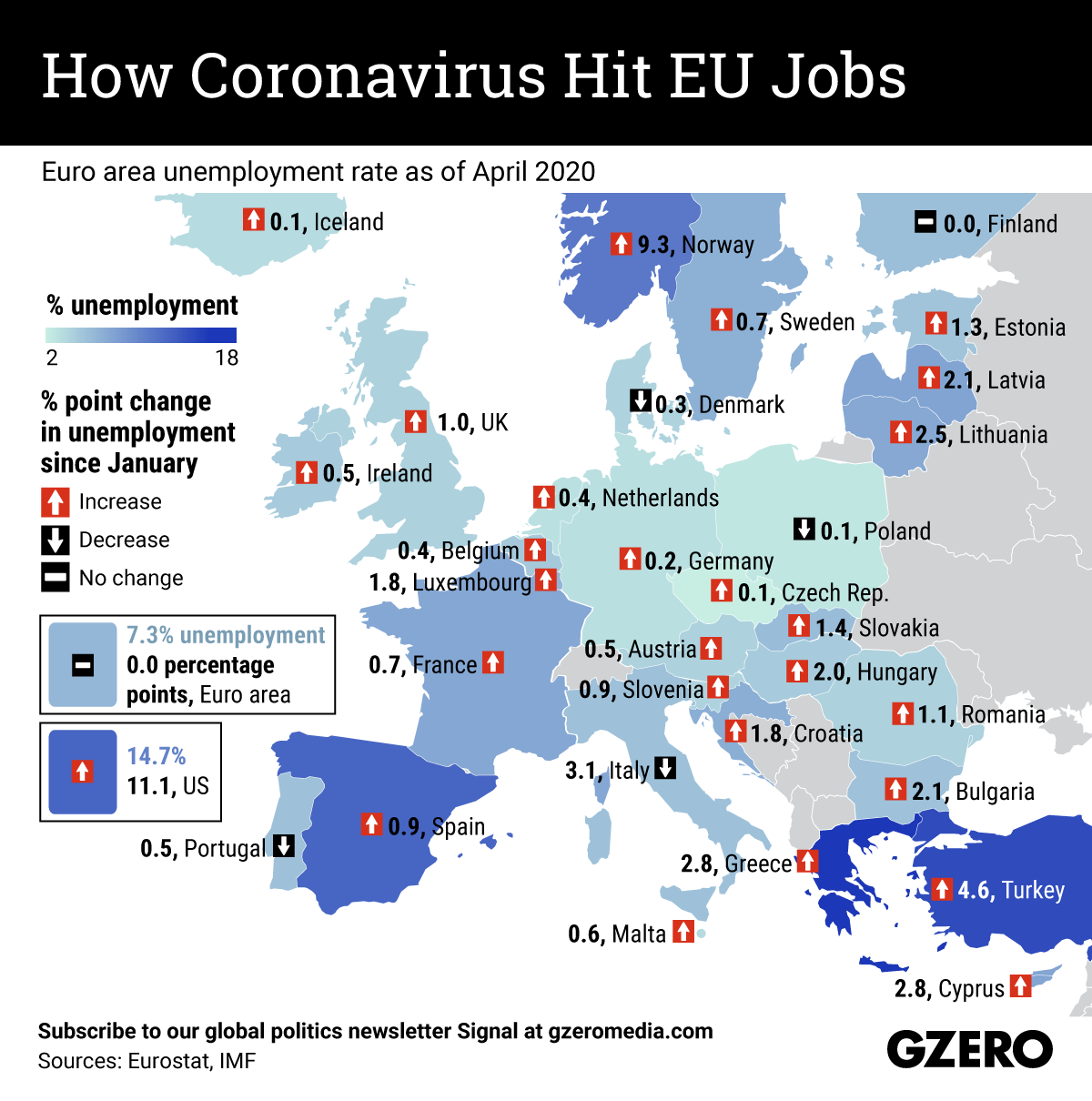The coronavirus crisis has clobbered all European economies, but most have avoided a severe spike in unemployment. That's in part because of government programs that directly subsidize workers' wages while also incentivizing employers to keep workers on the payroll by reducing their hours. This approach has shielded much of Europe from the kind of unemployment calamity that's plaguing the United States, where the jobless rate has increased sixfold since January and is now more than double that of the Euro area. Here's a look at how European job markets have fared in the time of coronavirus.
More from GZERO Media
A Chinese People's Liberation Army Navy Harbin Z-9 helicopter sits on CNS Yulin during a display of warships ahead of an exhibition at Changi Naval Base in Singapore on May 18, 2015.
REUTERS/Edgar Su
A Chinese naval helicopter flew nearly 10 feet from a Philippine patrol plane on Tuesday over a contested reef in the South China Sea, escalating tensions with Manila and Washington in the airspace over international waterways Beijing claims as its own.
Electricity is becoming crucial to a net-zero transition. It contributes to around 40% of global greenhouse gas emissions, and the demand is only increasing. A new Bank of America Institute analysis explores the solutions provided by nuclear — as well as the regulatory, supply chain, and financial risks.
Putin and Trump shaking hands in front a map of eastern Europe
Jess Frampton
- YouTube
What is Trump's long-term play with apparently treating Putin like a friend rather than an adversary? How likely would the release of all remaining captives, as proposed by Hamas, actually lead to a permanent truce with Israel? Does Bolsonaro's indictment for an alleged coup plot signal tough times ahead for Brazil? Ian Bremmer shares his insights on global politics this week on World In :60.
Delegates affiliated to Sudan's Rapid Support Forces (RSF) react during a meeting for the planned signing, later postponed, of a political charter that would provide for a "Government of Peace and Unity" to govern the territories the force controls in Nairobi, Kenya, February 18, 2025.
REUTERS/Monicah Mwangi
- YouTube
“The Taliban’s war is against women,” Fawzia Koofi, former Afghan parliamentarian, and women’s rights activist, told GZERO’s Tony Maciulis on the sidelines of the 2025 Munich Security Conference.
The U.S. and Russian delegations meet at Diriyah Palace, in Riyadh, Saudi Arabia, February 18, 2025.
REUTERS/Evelyn Hockstein/Pool
It was the first high level meeting between the two countries since Moscow's full scale invasion of Ukraine in February 2022.
Police officers stand guard as Congolese youngsters jostle to receive relief food, after fleeing from renewed clashes between M23 rebels and the Armed Forces of the Democratic Republic of the Congo. February 18, 2025.
REUTERS/Evrard Ngendakumana
100: M23 rebels – a Rwanda-backed militia – took control of the Democratic Republic of Congo’s second-largest city, Bukavu, on Monday.
Tesla CEO Elon Musk, right, sits beside then-Senior Counselor to the President Steve Bannon, left, as President Donald Trump hosts a strategy and policy forum with chief executives of major US companies at the White House in February 2017.
REUTERS/Kevin Lamarque
The latest salvo at Musk from Steve Bannon reflects the sharpening of already rough-edged rivalries within Trump’s circle between hard-core populists and hyper-libertarians.
© 2020 GZERO Media. All Rights Reserved | A Eurasia Group media company.
